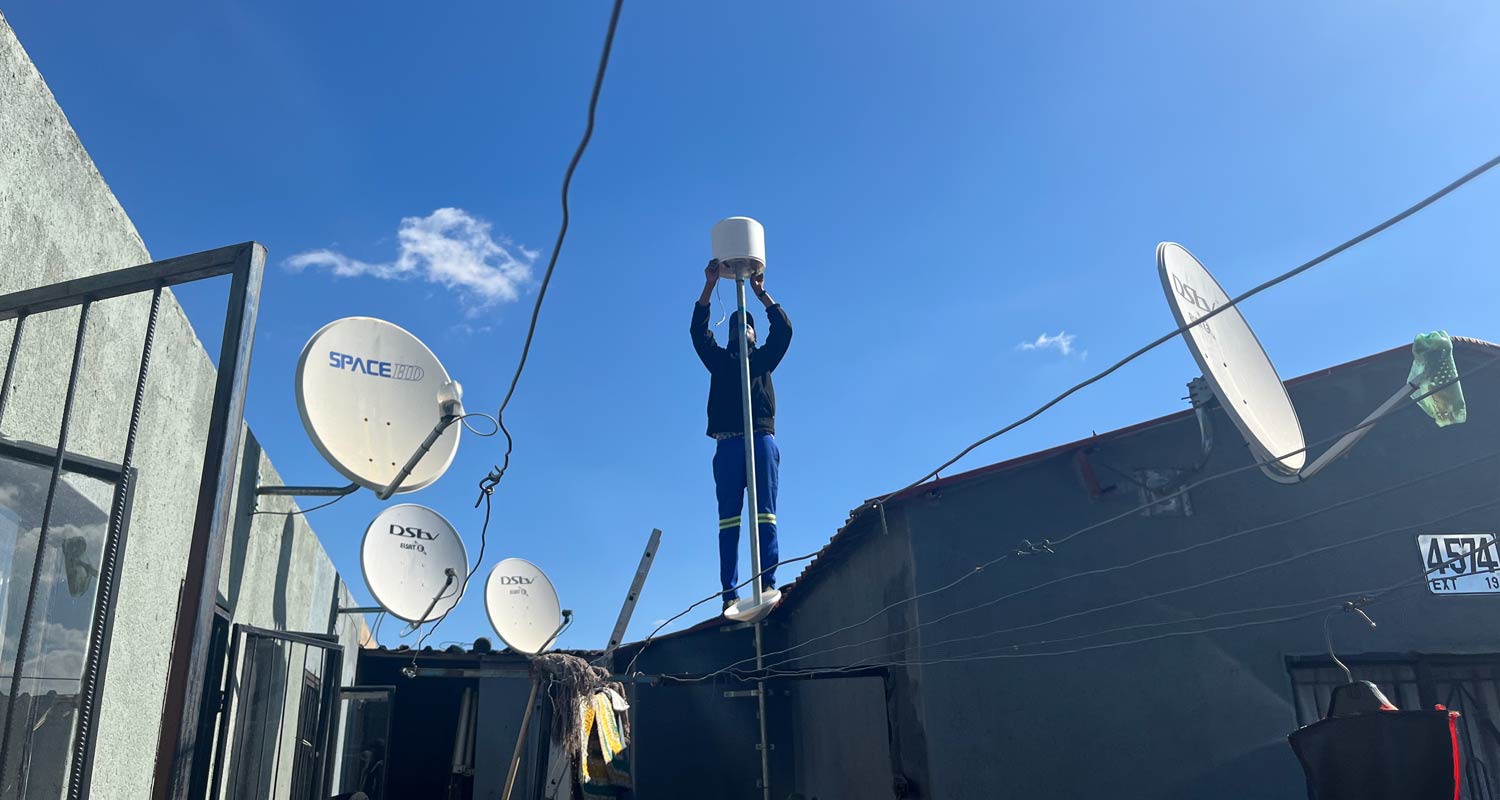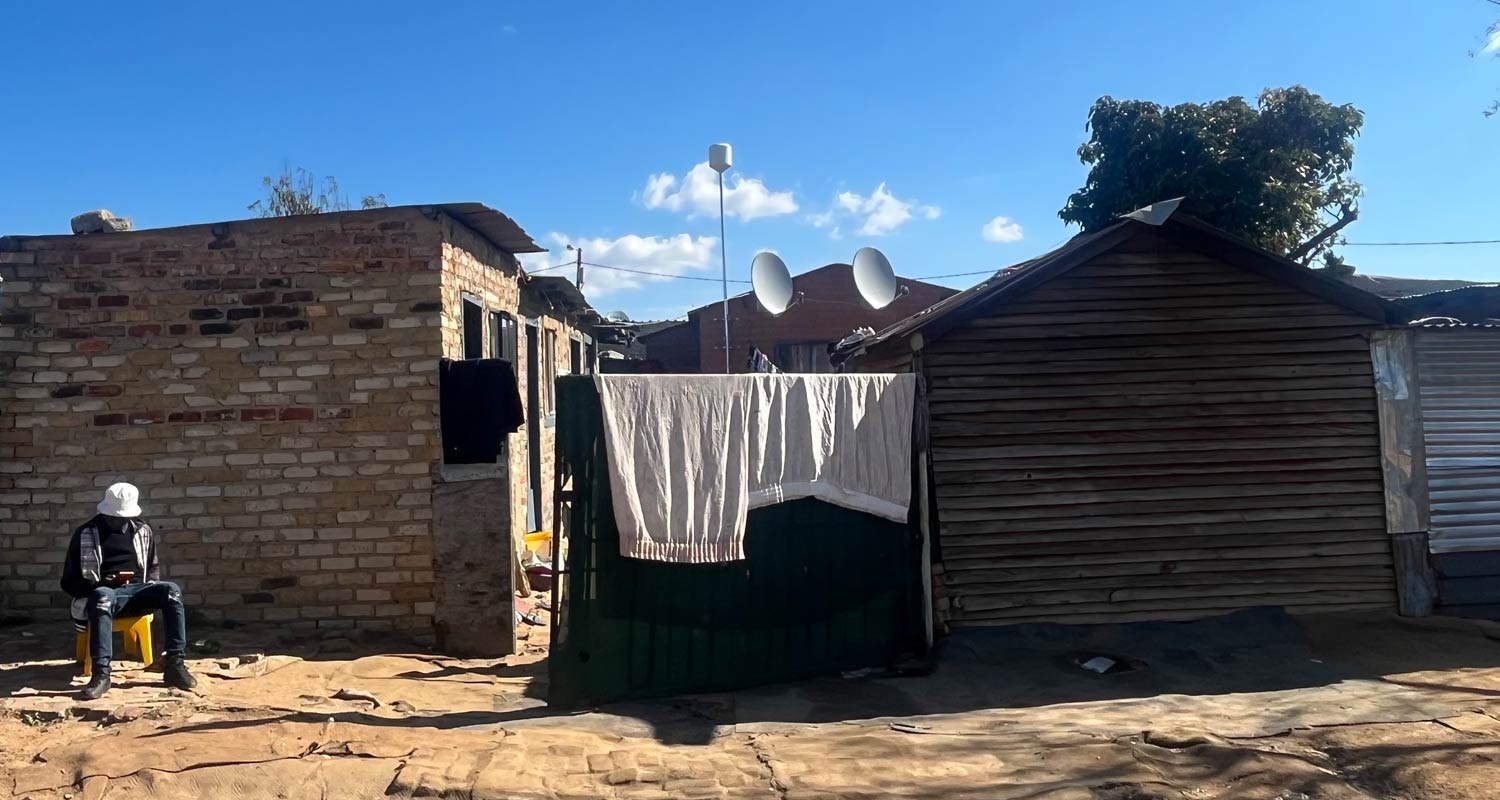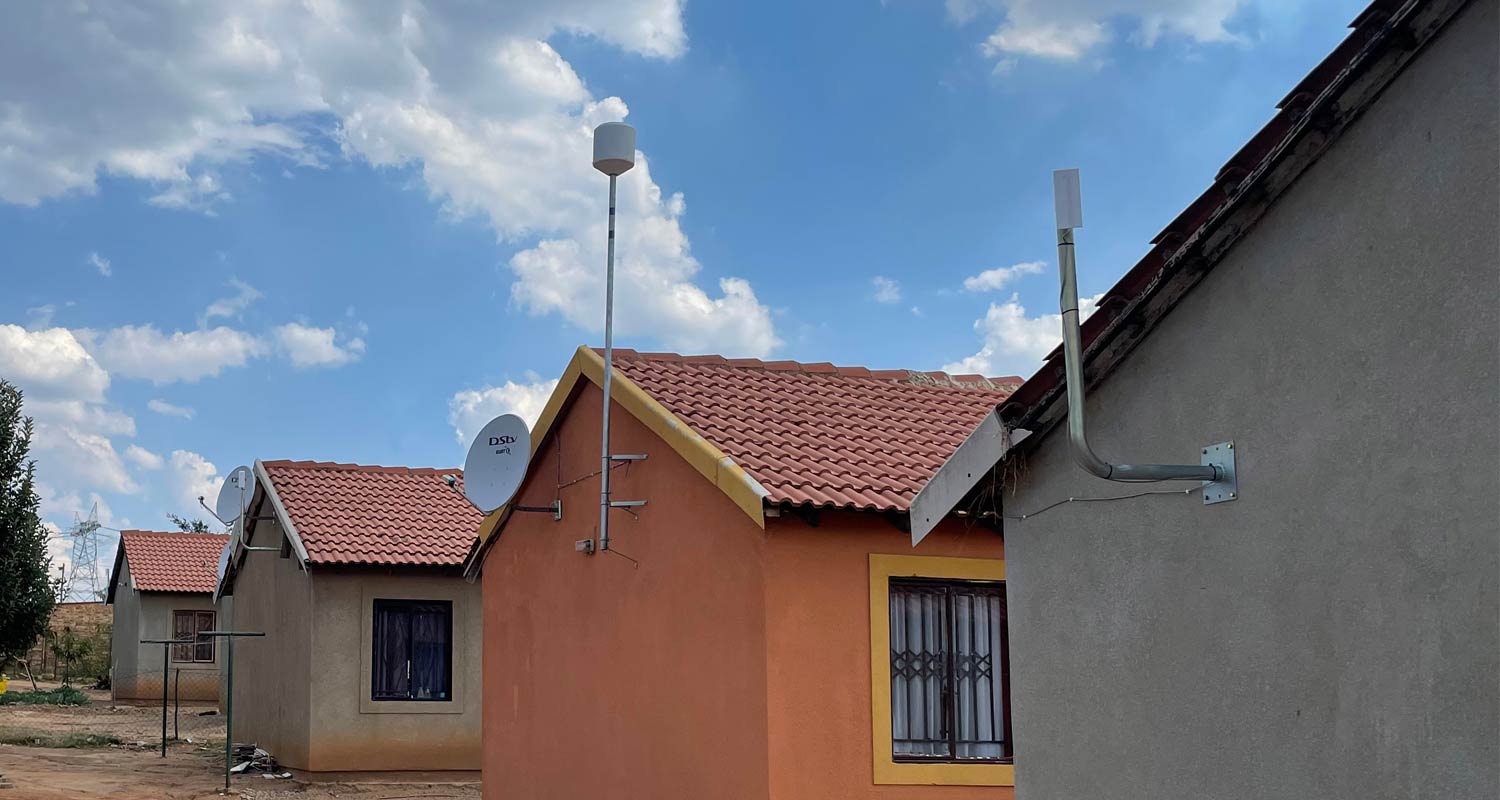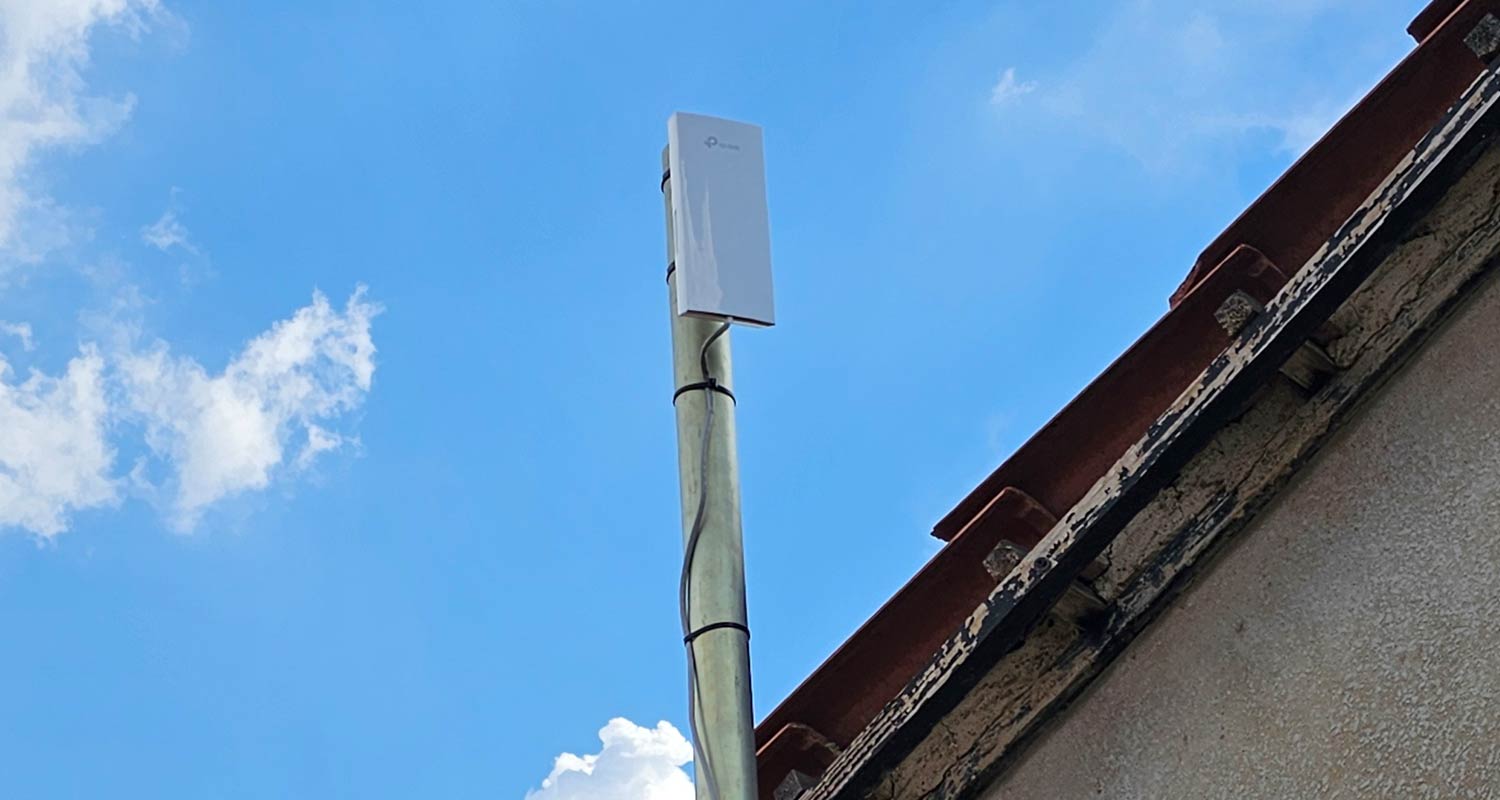 Mathews Mofokeng was streaming Netflix on his smartphone on the back seat of a battered old car in Ext 27 in Olievenhoutbosch – a sprawling township near Centurion in Gauteng – when TechCentral visited him on a sweltering Sunday afternoon earlier this month.
Mathews Mofokeng was streaming Netflix on his smartphone on the back seat of a battered old car in Ext 27 in Olievenhoutbosch – a sprawling township near Centurion in Gauteng – when TechCentral visited him on a sweltering Sunday afternoon earlier this month.
Mofokeng, who lives in a tin shack, was doing what he often does nowadays in his downtime: he was streaming online entertainment to his phone, without a care in the world about how much data he was using. He was in the car, windows and doors wide open, because the baking sun on his home’s metal roof had made it unbearably hot to be inside.
There was something unusual about Mofokeng’s house, though: this shack had an antenna mounted on the side – a “core node” in a mesh network that already provides completely unlimited broadband internet coverage to about a third of a township that’s home to an estimated 80 000 people. And it costs residents just R99/month.
Mofokeng wasn’t meant to have a core node attached his shack (the company behind the technology, Riot Network, doesn’t install them on informal dwellings), but he’d recently moved to Ext 27 from elsewhere in Olievenhoutbosch where he’d had access. And he decided he couldn’t live without uncapped internet, so he put up a core node on his new abode, as basic as his accommodation is.
Part of Mofokeng’s motivation is that he makes money reselling internet access to the homes around him – he collects 15% of the R99/month that his neighbours pay for a “leaf node” that they’ve installed on their houses so they can also access the mesh network and its uncapped data.
What many readers may find surprising is that Riot Network, which is deploying the network, is an entirely for-profit commercial venture. And its founders and backers – among them former Dimension Data executive and Sentech CEO Setumo Mohapi – believe that this, along with direct community involvement, has been key in delivering cheap, uncapped broadband into low-income communities. They think the model is replicable countrywide – and even across the African continent.
Uncapped internet for R99/month
When TechCentral visited the township on Sunday, 10 March, it quickly became clear to this publication that Riot was onto something big. Across large sections of Olievenhoutbosch, houses – and even informal dwellings like Mofokeng’s – have distinctive core nodes and leaf nodes attached to them, delivering what was previously unheard of to residents: uncapped high-speed internet at low cost. Many have taken to it like proverbial ducks to water, even hooking up their TVs so as to get access to the sort of streaming services like Netflix that in the past they simply haven’t been able to afford because of the cost of mobile data.
Riot Network, which was founded in 2017, is the brainchild of its three founders, CEO Jarryd Bekker, chief operating officer Moses Mpofu and senior radiofrequency developer Daniel de Kock, who had been tinkering for some time with solutions to reduce the cost of internet access in low-income communities.
The pair met at an incubation lab overseen by the late Prof Barry Dwolatzky at Wits University’s Joburg Centre for Software Engineering. Initially doing work around the internet of things, they soon pivoted into mesh networks and finding ways of driving down uncapped broadband costs.

Here’s how Riot’s system works:
- The company procures uncontended (business-class) wireless capacity from network providers – currently these are high-frequency 5G fixed-wireless from Comsol and point-to-multipoint fixed-wireless solutions from Wirulink. It hopes fibre backbone providers will soon join the party, too.
- It then connects these backbone links to “gateway nodes” (often also in people’s homes) in Olievenhoutbosch, from where it is distributed in the community to homes with core nodes.
- From there, the core nodes provide access to leaf nodes in the same community, sharing in the revenue that is generated, and making them integral to the solution. The leaf nodes can interoperate to connect back to the core nodes, and then back into the core network.
Bekker told TechCentral that Riot’s founders realised that to drive down the cost of connectivity, it made sense to allow communities to deploy the infrastructure themselves. So, DStv installers are empowered to put up both core nodes and leaf nodes, and to connect them – all using unlicensed spectrum in the 2.4GHz and 5GHz bands, the same frequencies you use to connect to your Wi-Fi router at home.
TCS | Uncapped fibre for R5/day – Isizwe’s big gambit
But the really clever aspect of it is that entire communities – of core and leaf nodes – can share a single, high-quality and high-capacity internet pipe, driving down costs while still getting (shared) access to a top-tier package they wouldn’t be able to afford on their own.
Watch a special TechCentral Show (TCS) interview with Riot Network co-founders Jarryd Bekker and Moses Mpofu, including footage from Olivienhoutbosch and interviews with residents:
Even at peak times, users will get a minimum of 5Mbit/s, according to Bekker. During off-peak times, it is often far quicker – sometimes up to 100Mbit/s or more. Pricing is R99/month per node, with up to three devices able to be connected per node, and there are no data caps at all.
If users need to connect more devices or people (many township homes have backyard residents), they can simply install another node. The CPEs – or consumer premises equipment installed inside people’s homes – are built locally, by Microtronix. Much of the intellectual property underpinning the solution was developed in-house.
Bekker said Riot doesn’t want to be seen as a competitor to established telecommunications operators, but rather as a complementary service. For example, he said, business-focused internet service providers can supply a single link to a gateway node rather than having to service dozens of low-paying clients in a particular area. This improves their margin, and also improves utilisation of their networks during non-peak periods (outside normal business hours). “Our goal is to augment existing networks, presenting new clients to these ISPs and telcos,” he said.
…article continues below…



Core node operators are encouraged to have backup power to keep their nodes operational during load shedding. Both gateway and core nodes consume just 4-7W, so having a backup to keep them online is relatively inexpensive. Riot has provided small backup batteries to some core node operators, but others have taken the initiative to get their own – realising that it keeps the community happy and benefits them because they share in a portion of the revenue.
Interestingly, despite the high levels of crime in the township, Bekker said none of the equipment has ever been stolen. “It’s on people’s houses – they look after it. There is a status associated with having a node.”
Watch | A tour of Vumatel’s Alexandra fibre roll-out
Riot has big plans to expand its solution into other townships around Gauteng – and over time, further afield, too. (Watch the video for more information about the company’s funding, and how it sees the project developing.)
The founders have big plans, including serving content from the “edge” – directly from the core nodes – and has already run a pilot in this regard with Wikipedia. Bekker said there’s no reason South Africa’s school curriculum can’t be distributed directly from these nodes, empowering youngsters with the educational tools they need.

Backer Setumo Mohapi, who has previously served as CEO of the State IT Agency (Sita) and Sentech, and who serves on Riot’s advisory board, told TechCentral that Riot will succeed where government projects have failed precisely because it’s a commercial venture and involves local communities. He believes the mesh technology developed by Riot will prove transformative for low-income communities.
“This is not a charity. It’s based on a proper value exchange and is purely commercial,” he said. People with core nodes become “the best salespeople” for connecting others in their communities, and the network effectively builds itself.
“No one in China would understand this model,” he said. It’s a South African-designed solution that could solve the digital divide. – © 2024 NewsCentral Media

